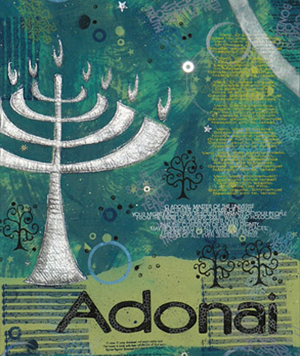December 18
Day Two
O Adonai, and leader of the House of Israel,
who appeared to Moses in the fire of the burning bush
and gave him the law on Sinai:
Come and redeem us with an outstretched arm.
The book of Exodus doesn’t tell us how Moses ended up keeping his father-in-law’s flock in such a remote place that it describes it not as wilderness but as beyond the wilderness. The lead up to the story of the Burning Bush portrays Moses as a person who deeply cares about people, especially suffering people. He sees an Egyptian beating a Hebrew and it upsets him so much that he kills the Hebrew. Similarly, when some shepherds bother a few girls trying to water their flock, he drives the shepherds away.
We care. Over this season, our emotional lives run the gamut from wonder and joy to pain and anger. We might instinctively ignore them because we have too much to do. For many adults, the holidays are about other people’s emotions, not our own: our children, our relatives, our guests. This retreat invites us, however, as we enter a space of discernment, to survey the landscape of our emotions. A nun with a Southern accent once reduced the human emotions to four for me: glad, sad, mad, and scared (in her accent this last word rhymed with the rest). What do I feel in these days? What have I felt over the past day? What do I feel right now?
If we spend our days managing other people’s emotions, then when we finally pay attention to our own, we might face the temptation to manage them as well. Can I give myself permission to just feel my feelings, especially the negative ones: to acknowledge the ill will I feel toward this person in my family, the fear about the aging of an elderly person, the unease about the future of a young person, or the pain that returns in the form of old wounds or loss at this time of the year?
God cares enough to find us. God did not appear to Moses when he was praying at a shrine. God found Moses beyond the wilderness in the midst of doing something for someone else. Who knows what Moses was thinking about as he wandered with his father-in-law’s flock? As a caring person, he might have been thinking about his family or his people. He was probably tired and maybe a little discouraged. He could have been worried about finding water or good grazing for his sheep.
He had seen forest fires before, but something piqued his interest about this one. “The bush was blazing, yet it was not consumed.” How does God pique our interest, not apart from our concerns, but in the midst of them? Moses experiences a sense of awe and reverence when he realizes the message is from the Lord. He removes his shoes. Do we take the time to notice these messages from God?
God knows us. God speaks to Moses in an intimate way: “I am the God of your fathers, the God of Abraham, the God of Isaac, and the God of Jacob.” God does not address us as a telemarketer would, from a script, but as a friend, who intimately knows our story. Good memories always impress me, whether in friends or spiritual directors. More than giving me good advice, a friend will make me feel listened to; he won’t gossip about me but will remember my story the next time we talk. With good friends, I share a tremendous amount of history, things we have gone through together. Who in my life makes me feel that way? What would it be like to feel God that way?
I have observed the misery of my people who are in Egypt; I have heard their cry on account of their taskmasters. Indeed, I know their sufferings, and I have come down to deliver them from the Egyptians, and to bring them up out of that land to a good and broad land, a land flowing with milk and honey.
God wants good things for us. In addition to my suffering, God also knows my dreams and desires. Can I take a moment and acknowledge those? What do I want for myself, my family, and my friends at this time of year? Probably the joy of spending time together, in whatever particular ways we do that. Maybe a better relationship with a particular person. If something or someone specific concerns me, I take the time to acknowledge that before God. No matter how long I stay away, I always remember the layout of my parents’ house and the neighborhood where I grew up when I go home. In a similar way, no matter how much time has passed since we last felt God, God remembers the layout of our interior lives. What would it be like to for me to invite in his redeeming presence?
For one approach, I could follow along with the meditation, pausing at what moves me, and answering the questions as they come. For another more structured approach, I could refer back to the previous day.